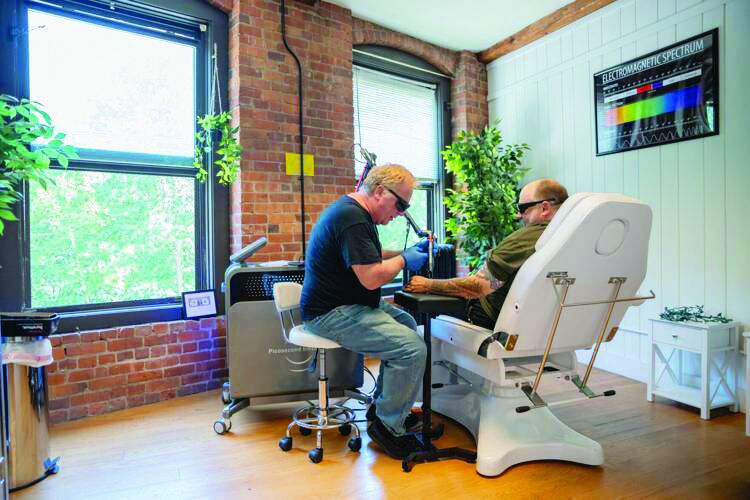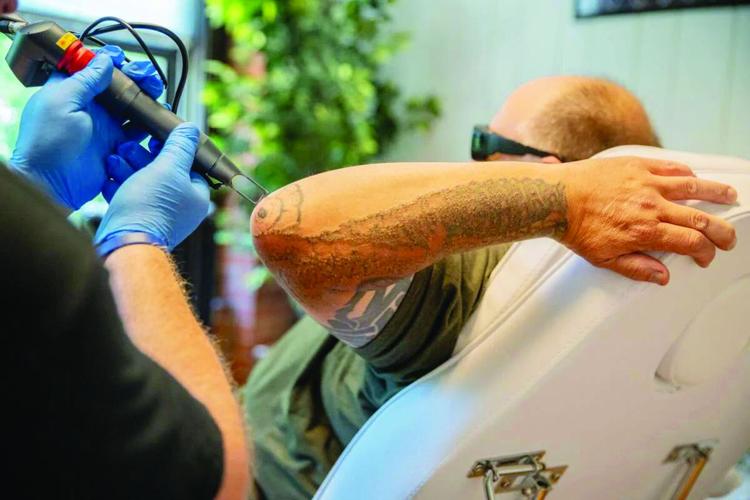When Jon Wolfe was a 17-year-old punk rocker in Muskegon, Mich., he had a dragon tattooed on the side of his head.
It seemed like a good idea at the time.
“But, as I went through life, I couldn’t wear short hair because you could see the dragon, and how do you explain something that stupid when you’re in your 30s and 40s?,” said Wolfe, 55.
“So I decided I was going to get it removed and I thought, ‘If I’m going to pay the money to have this thing removed, I might as well pay more money and get certified and be the guy that removes these and then have a nice little side income.’ ”
Thus was born Eraserhead Tattoo Removal in Brattleboro in April 2024. Wolfe also works full-time as a machinist.
“I’m seriously not in this for the money,” said Wolfe, who lives in Westminster, Vt., and is a former Keene resident.
“I love helping people. That is the whole purpose of this.”
In fact, he will remove tattoos for free if they are associated with hate, the occult, trafficking, gangs or prison life.
Some people are overwhelmed with negative feelings about their tattoos.
“They get a tattoo in a bad emotional state and then they come to their right mind later on and look at what they’ve done to themselves and they think, ‘Oh, I can’t go on like this. Every day I have to look at this reminder of a bad decision I made or a bad relationship that I was in,’ ” Wolfe said.
“There are people that have serious emotional issues associated with these images, and they are very grateful to know that they can be removed and they will never, ever have to look at their ex’s name again or their abuser’s symbol or the gang that they were affiliated with.”
To remove tattoos, Wolfe uses a special laser designed for the job. It uses ultra-short pulses, measured in picoseconds, or one trillionth of a second.
He said people report minor discomfort in the process, which can last a couple minutes for each session, longer if it is a large tattoo. Six or more sessions may be required, each separated by six to eight weeks, so the whole process could take a year.
Charges start at about $100 a session for small tattoos.
Some tattoos are harder than others to remove, depending on the tattoo’s age, the coloration and amount of the ink that was used, the location on the body and the pigmentation of the skin.
He’s been removing a lot of back-of-the-neck tattoos on women.
“I would say most of the people who come in here are women, and they’re generally in their early 30s,” Wolfe said. “They pretty much have a normal life and want to forget about their carefree youth.”
Shari Henry, 46, of Brattleboro is one of Wolfe’s clients.
She tattooed the name of a man on her shoulder when she was about 25. After they broke up, she had that tattoo transformed into the image of a butterfly, but she never liked how it turned out.
“And then I was like, ‘Oh, I’ll add some flowers and maybe I’ll like it,’ but I just hated it more,” Henry said.
She said she wished she had listened to her mom, who had counseled against getting the tattoo in the first place.
Another one of Wolfe’s clients is having a punk rock tattoo removed.
“It’s a bio-mechanical full-arm piece, a full sleeve from the 1980s,” Wolfe said. “It’s pretty hideous. The guy is in his 50s and just wants to stop looking at it.”
One man is having Wolfe remove a tattoo of two tear drops, meant to symbolize two people who were murdered.
Another had a tattoo on his hand that paid homage to a punk rock band called “Rising Boob.”
“He had this tattoo of a boob rising up over a mountain range, and it had the word ‘boob’ underneath it,” Wolfe said. “He has had this since the 1970s and he’s a pastor, a preacher, and he had to cover up that tattoo with a Band-Aid because the Sunday school kids were asking about it.”
Sometimes a parent will set up a tattoo-removal appointment for a child.
One mother brought in her son who had “666” tattooed on his neck.
“I said, ‘I’ll take care of that for free,’ and it was gone in two sessions,” Wolfe said. “The kid felt really dumb, but I don’t blame him.”
Wolfe recalled that when he was a kid, getting a tattoo was a statement of nonconformity.
“You were permanently marking yourself as being unfit for society,” he said. “You were saying to the world, ‘I don’t want you. I’m not like you. I’m different and here’s permanent proof.’
“But now it’s changed to where if you don’t have a tattoo you’re in the minority, and it’s almost a sign of disobedience and individualism to not have a tattoo these days.”
Wolfe moved to Keene from Michigan in 2016, and has since bought and sold homes and lived in various places in the region.
One of the reasons he came to New Hampshire is because he liked that the state doesn’t have a general sales tax or income tax.
“I had a fit about taxation one day, and I said, ‘I’m going to go to New Hampshire.’ So I did. I came here and it was autumn and it was so beautiful.”
He worked as a private detective for a time before coming to New England.
When he’s not working as a machinist or removing tattoos, Wolfe enjoys doing stained-glass artwork and making video games.
As a teenager, he played bass guitar in a punk rock band — and saw all kinds of tattoos — before going to Central Michigan University in Mount Pleasant and Trine University in Angola, Ind.
“My degrees are in psychology and criminal justice, so it’s kind of funny, I’m not even doing that, I’m doing tattoo removal. But whatever, life is funny.”
•••
Rick Green can be reached at 603-352-1234, ext. 1435, or rgreen@keenesentinel.com.
These articles are being shared by partners in the Granite State News Collaborative. For more information, visit collaborativenh.org.




















(0) comments
Welcome to the discussion.
Log In
Keep it Clean. Please avoid obscene, vulgar, lewd, racist or sexually-oriented language.
PLEASE TURN OFF YOUR CAPS LOCK.
Don't Threaten. Threats of harming another person will not be tolerated.
Be Truthful. Don't knowingly lie about anyone or anything.
Be Nice. No racism, sexism or any sort of -ism that is degrading to another person.
Be Proactive. Use the 'Report' link on each comment to let us know of abusive posts.
Share with Us. We'd love to hear eyewitness accounts, the history behind an article.